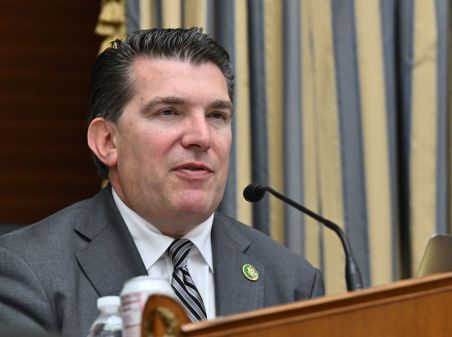Bipartisan bill to codify AI research resource at NSF gets reboot in House

A bipartisan bill to fully establish a National Science Foundation-based resource aimed at providing essential tools for AI research to academics, nonprofits, small businesses and others was reintroduced in the House last week.
Under the Creating Resources for Every American To Experiment with Artificial Intelligence (CREATE AI) Act of 2025 (H.R. 2385), a full-scale National AI Research Resource would be codified at NSF. While that resource currently exists in pilot form, legislation authorizing the NAIRR is needed to continue that work.
“By empowering students, universities, startups, and small businesses to participate in the future of AI, we can drive innovation, strengthen our workforce, and ensure that American leadership in this critical field is broad-based and secure,” Rep. Jay Obernolte, R-Calif., who sponsors the bill, said in a written statement announcing the reintroduction.
The NAIRR pilot, as it stands, is a collection of resources from the public and private sectors — such as computing power, storage, AI models, and data — that are made available to those researching AI to make the process of accessing those types of tools easier. Often, it’s referred to as a way of “democratizing” access to those resources.
A pilot version of that resource was first recommended in 2023 by a task force studying a potential future NAIRR, and was eventually launched under former President Joe Biden’s AI executive order. Despite President Donald Trump’s rescission of that order in January, an NSF spokesman confirmed to FedScoop that the NAIRR pilot is still in effect.
Per the NAIRR pilot website, the program has supported more than 340 research projects over 40 states and Washington D.C. Organizations contributing resources include 14 government agencies and 26 non-governmental partners, such as Meta, Google, OpenAI and NVIDIA.
Rep. Don Beyer, D-Va., who co-sponsors the legislation, called the NAIRR an “excellent resource” and highlighted its benefits for researchers, educators and small businesses, in addition to students who might use the resource to learn how to use AI. Beyer himself has pursued a master’s degree focused on AI while serving in the House.
“This access to high-quality data, compute resources, and support would drive the innovation necessary to strengthen our global competitiveness in trustworthy AI development and in turn help accelerate solutions to the world’s most pressing challenges,” Beyer said.
Although the bill gained some traction last Congress, advancing out of committees in the House and Senate, it ultimately didn’t get attention on the floor of either chamber. This Congress, Obernolte has said he’s “cautiously optimistic” about the legislation.
A Senate version hasn’t been reintroduced yet. The co-sponsors last Congress were Sens. Martin Heinrich, D-N.M., Todd Young, R-Ind., Cory Booker, D-N.J., and Mike Rounds, R-S.D. A spokesperson for Young said they are working “on continuous changes to the bill this Congress” and didn’t have an update on a timeline.
Supporters of the bill include the Information Technology Industry Council, Americans for Responsible Innovation, the Business Software Alliance, and the Software & Information Industry Association.
NSF Director Sethuraman Panchanathan has in the past emphasized the need for a full-scale NAIRR to keep the work going.
In an interview last May with FedScoop, Panchanathan said the agency was working to expand and extend its existing partnerships but needed more funding to maintain its efforts. At that time, he estimated the NAIRR would be able to operate the pilot projects for a “a year, maybe more.”
Investment by the federal government is what will help the project scale, Panchanathan said, “which is needed and will just speed up the progress.”






